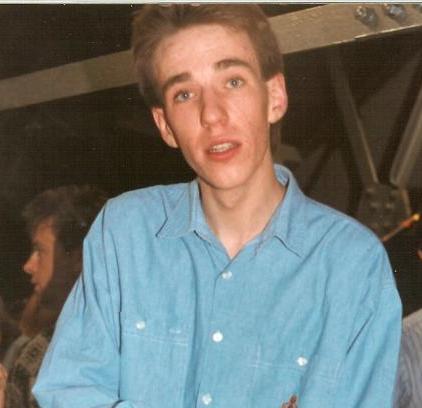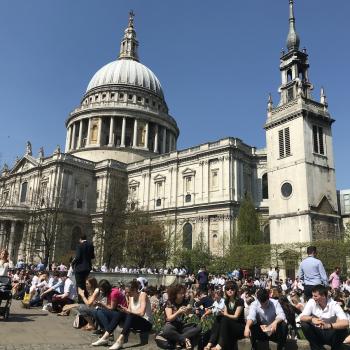How old should a believer be before being baptised? Some say you should be an adult or at least an older teen. One of the advantages of growing up in a new church was that the rules had not been written. As I explained I was in the very first Newfrontiers church and spent about a year campaigning to be allowed to be baptised even tho I was not yet a teen. In the end the decision was made in my favour in light of my experience of the Holy Spirit. As a result, one of my favourite verses was the following, and I remember using it as one of my arguments!
Acts 10:47—“Can anyone withhold water for baptizing these people, who have received the Holy Spirit just as we have?”
My parents and elders found themselves with no arguments left. I had received the Spirit just as they had. I was clearly a Christian. How could they stop me any longer from being baptized?
I remember the day well. We had a temporary wooden baptistery with a plastic lining. I loved watching the pipes being used to fill and empty it. For some reason that day someone decided it would be kind for me as a youngster not to be first. They started with the oldest and worked down to me the youngest.
I waited for what seemed like an eternity. Finally it was my turn. The water was cold. I remember being pushed under the water and brought back up. Now I was a “proper Christian.” I had told the world I would follow Jesus. It was a solemn moment and yet a great celebration. I felt like it was almost my funeral since I was so determined to die to myself and live for Jesus.
After receiving the Sprit and being baptized, very quickly I began to prophecy regularly in church meetings even as a young child. At the time we also held open air meetings in the park. My sense of a need to share the gospel grew. I would ask to be allowed to tell my story, and would sometimes be allowed to share a testimony from the microphone.
More than once my parents would discover I had disappeared. I would be found with leaflets I had taken from the adult supply to explain the gospel to someone. I was sure they were trying to hide the leaflets from me, but I would always find them. I would usually choose older people as I figured they had less time left to live. My parents would urge me to only do this with an adult accompanying me. I retorted, “But then the adult doesn’t let me speak!”
 At around this time I had an encounter with my grandad, the retired tent evangelist, which was very significant to me. My Uncle was home from New Zealand and we were all visiting my aged grandfather. Suddenly, as we were walking, my grandad became very clear. He turned to me and said, “This will be the last time I see my son.” I mumbled my disagreement, but he had a steely look.
At around this time I had an encounter with my grandad, the retired tent evangelist, which was very significant to me. My Uncle was home from New Zealand and we were all visiting my aged grandfather. Suddenly, as we were walking, my grandad became very clear. He turned to me and said, “This will be the last time I see my son.” I mumbled my disagreement, but he had a steely look.
He spoke of the lack of faithfulness of many to the word of God and solemnly passed on a baton to me, saying that when I was older I, too, must preach the Bible in a trustworthy manner.
All was going well for me, and I had a growing sense of God’s hand on me for some form of service as the years progressed. I was happy to be in church and looked forward each year to the Newfrontiers conference, the Downs Bible Week.
At the last Downs, a preacher named Henry Tyler, who did a seminar on missions, impressed me. I sat through his talks eagerly taking notes, and at the end Henry told me how encouraging it was having me there. You expect that the listener would thank the hearer, not so with Henry!
Henry told me that he felt a sense that God was at work in me for some service to him in the future. I had already began to feel that myself. He told me to keep in touch, which I did until his death many years later. It was Henry who introduced me to Spurgeon and encouraged me to read biographies of Christian leaders.
Then I was surprised to hear that my world was about to be turned upside down—we were to move to another part of the country where there was no church in the family of churches we were part of.
I sensed God saying, “Maintain your links with Newfrontiers,” which I did without formally being a part of the movement over about the next ten years. I continued to find their conferences like Stoneleigh Bible Week and Clear Vision over the New Year to be invaluable, and even attended a week of outreach led by Lex Loizides which had a major impact on me, and reminded me of the passion and enthusiasm for God and sense of belonging I experienced within Newfrontiers that I was missing. Lex gave me a copy of the Soul Winner by Surgeon, which is a book I have read often over the years, whenever I feel that my drive to see others become Christians is needing encouragement.
For me, moving away from my friends and the church I had so loved was tough. Suddenly I discovered that there were churches that were different to the one in which I’d grown up. Well, to be fair, I had previously also been aware of the Anglican church that had been linked to my primary school—but the subtleties of the different nuances of church was something I would discover over the next few years.
During the next ten years I attended two independent charismatic churches, an Elim Pentecostal, and St. Helen’s Bishopsgate (an Anglican church), where I loved the preaching, but hated the worship style at the time.
I also went through a hard time at school since pupils at my new grammar school really didn’t know what to make of this crazy Christian. The hard times didn’t begin immediately as when I arrived I landed straight in the nearest thing to a revival I have ever experienced. The kids were praying. I don’t know how it started, but we met for prayer every morning before school. Revival is often characterized by protracted seasons of prayer.
These kids had decided quite spontaneously a few weeks or so before I arrived to begin to pray. And boy did they pray. The tangible presence of God was in the room in such a weighty manner. I can only remember a handful of other times in my life when God felt as close as he did at those times. There was seriousness, as well as a joy about it all. It was this seriousness that marked it out from what I would later experience in the so-called “Toronto Blessing.”
What was the Toronto Blessing: Move of Holy Spirit or fraud?
The Toronto Blessing, incidentally, seemed to be a joyful time of refreshing which had a limited impact on the outsider—there were not large numbers of conversions as far as I am aware.
The experience I had in a grammar school lacked the phenomena of Toronto, but it did have salvations. People would come to the prayer meetings not quite knowing why and would be saved there and then. There were tears sometimes. There was a sense of God undoing you in the room—he revealed himself in his fearful holiness and boy did you want to get yourself sorted out. There weren’t hundreds of people saved, but there are times even now when I look back on those days and say, “Do it again, Lord!”
Sadly those times of blessing didn’t continue for long, and before I knew it most of the boys who had been saved in such a way had left the school. I found myself running what was left of the Christian Union after it had decided to split from meeting with the CU from the nearby Girls High School. I would stand up in school assemblies and announce meetings people could come to. I would propose to the school debating society subjects for debate of a Christian nature. I even managed to organize a mission week which involved a whole team taking over many lessons and saw a number of people sign up for “just looking” classes. I learned much at that time, including depending on God for resources—funds for the mission week came in to cover the last penny of expenses.
But, I became painfully aware of two things. One, that for all our efforts God was not so obviously present with us owning what we were doing. Two, the majority of the kids in the school seemed to hate me for no apparent reason, other than that I was the leader of the “God Squad.”
There seemed to be little fruit at the time, but in later years I discovered that wasn’t entirely true. One of my most angry opponents in the school debating society decided on arrival at his university that he would check out for himself the truth of what we had bandied around. He said that he had never understood how I could continue being nice to him whilst he was nasty to me! Within weeks he was powerfully saved.
When I got to medical school, I met up with another old student form my school who was a bit older than me. He reported that he had sat in meetings there, especially one when I was speaking about the evidence for the resurrection, thinking, “Why does everyone else seem to disagree with him, but I feel like what he is saying makes sense?” He became a Christian at Greenbelt the summer after leaving school.
Hearing of these later fruits from what we did at that school was a great encouragement to me—we never know the impact we are having on the people with whom we share the gospel.
But deep inside at that time I felt rejected and alone. I was angry, even with my parents, because I wished we hadn’t moved. I wasn’t really enjoying my church even though they had been gracious enough to give me my first preaching opportunity whilst I was in my early teens. I am sure that the problem largely lay in me rather than anyone else.
I felt like no one in the world loved me (which was not, of course, true!). I remember school kids broke my arm, and I was not invited to many parties during those years. One day, I was hiding in the school library and discovered a book by David Wilkinson—it was “Have You Felt Like Giving Up Lately?”
The message of the book seemed to me to be that I needed to learn to depend on God alone—if you like, make God my “one thing.” I remember so well saying to God, “Are you saying I have to get by on your love alone?” I felt God say to me, “Yes, but trust me to provide others who will demonstrate my love to you.”
This was a radical departure for me and changed my life. Shortly after that I joined a different church and met some very dear people who impacted my life massively. We were in a “youth group” which included people from age 13 to 30ish. I was able to get involved in the leadership of that group, and more importantly, met some great friends.
The church pastor greatly encouraged me in my sense of call to some form of ministry. He prophesied that I would go on to affect thousands of people- I was astounded years later when the surprising growth in readership of this blog led to that prophecy being fulfilled. I still find it genuinely surprising to realize that my blog witterings have been read by so many, and I hope give some benefit to some. I remember that at the time I was given this prophecy I simply didn’t believe it since I still felt that I was just the kid in the playground no one wanted to play with.
By the time I was in my late teens my life was going really well. I had been given more experience of Christian leadership than most people at that age. I had preached several times, including once to around 300 people. I had done well at school and was about to head off to medical school to train to be a doctor—although I was secretly convinced someone had swapped my exam papers over and that someone else was mystified as to why they had failed their A Levels! Life was sweet, although I never did have many friends at school. With the confidence of youth I knew little of the plans God had in store for me just around the corner when I moved away to university. I was about to be surprised once again!
By the age of 18, I had a lot of the over-confidence of youth, but that was tinged with the realization that I had a lot to learn. As I left the safety of my parental home and launched out into London to study medicine, God had a plan to teach me one of the most important lessons of my life—one which every now and then I am reminded that I still do not fully live in the light of.
My youthful enthusiasm for God was, at least in part, because I felt I could hold my own socially in a church environment much better than I could out in the world. It’s funny, because like many outwardly confident gregarious people, I was far from confident on the inside.
Although all my evangelistic activities at school made me feel like public enemy number one, I would console myself that surely God was pleased with me despite the views of my school colleagues. In church, I had a different role and I took a lot of solace from feeling that people there valued my contribution. As I already described, I had been given leadership and preaching experience and received a lot of encouragement. I was convinced that some sort of ministry awaited me, having had a sense of “call” since early childhood.
I foolishly persuaded myself that if life at school was hard, at least my work for God’s church showed that I had something to offer. God was about to go to work to begin to destroy the pride that I didn’t even realize I had.
When I arrived at Medical School, I was just another young kid in the Christian Union, and at church. For years I did not get asked to do a single bit of what I arrogantly considered “real ministry.” I didn’t get asked to lead a Bible Study. I didn’t preach. I was never on the Committee that ran the CU. At first I struggled with this, but gradually my dreams began to fade.
God has a way of taking a dream and killing it—stone dead. Sure, he will often resurrect it years later, but you don’t tend to think much about that at the time—all you can see is (to paraphrase Monty Python) your dream is “stone dead, demised, passed on, no more, has ceased to be, a stiff, bereft of life, snuffed out, up the creek and kicked the bucket, extinct in its entirety, an ex-dream.”
I remember well once during those years, when someone suggested that I might preach, the thought that went through my mind was simply, “No way!”
All this happened to me over the course of a few years, and much as you might think that process couldn’t have been from God, as I look back, I am more and more convinced he was, in fact, orchestrating the whole thing.
I am glad of two things, both of which suggest that perhaps the dream wasn’t in truth totally dead. Firstly, although during this time I found myself worshipping in different kinds of churches, I kept my links going with Newfrontiers by attending the Bible Weeks, and also through a friendship with a pastor, a dear man named Henry Tyler (who was my mentor for many years and who comes back into the story later on). Secondly, I did not lose my relationship with God, nor my love of reading theology and the biographies of preachers of the past.
When I arrived at university I was suddenly a small fish in the big pond of London. The successful University Christian Union didn’t seem to need me to exercise the gifts of which I’d sadly become proud, nor did the charismatic church I attended in the morning or the evangelical Anglican church I attended in the evening.
Suddenly I was not “doing things” for God anymore; no preaching, no leadership. This carried on for several years, and I didn’t press for things to happen, but instead slowly, and initially reluctantly, began to refocus my relationship with God from “doing” things to “being” his child.
Terry Virgo describes receiving a prophetic word early-on in his Christian walk that told him he was called primarily to be a worshipper of Jesus, and that anything else was a bonus. That was the lesson God wanted to engrave in me in those “fallow” years as a medical student. I only wish that I could honestly say that my teenage years were the last time I busied myself with too much activity and not enough falling in love with Jesus.
The truth is, sadly, that like so many of us, there have been many times in my life where I have been so caught up with what I was doing for God that I forgot that the most important thing he wants from me is for me to simply be his son and worship him. In fact, often when I am reminded of these times by re-reading my own description of them it has made me realize that I have forgotten this same point. Later in life I would get very sick and would again have to learn how to be a human being rather than a Human Doing.
How foolish we are to believe that we can give anything to God with our hard work. As Paul puts it in 1 Corinthians 4:7:
“For who sees anything different in you? What do you have that you did not receive? If then you received it, why do you boast as if you did not receive it?”
God has given us everything we have, and even our serving him is just another expression of our dependence on him. He is the one who gives us every breath that we should take as a gift of grace, not as our right.
How often do we Christians get frustrated because our so-called “rights” are violated, or because we didn’t get what we wanted, or because our hard work wasn’t appreciated, or even because our “ministry” isn’t recognized by others?
The true servant of God is immune to such thoughts for he realizes that even the strength he uses to serve is given him by God, and that it is God who decides what paths he wants us all to take.
I wish I could learn this once and for all, but I guess we are put on earth to struggle with this issue all our lives. There is something within us that longs for self-sufficiency, self-fulfilment, and self-worth. God, instead, wants us to be God-dependent, God-fulfilled, and worthy only because of what Jesus has done for us.
How frequently we need to take a pause and refocus our life once more on Jesus and knowing him better. Everything else must flow out from that. There should be a sense of dissatisfaction within us whenever we are guilty of merely filling life with activity and not leaving enough time to reflect and grow as a worshipper of Jesus. I am brought back to a passage I am often reminded of:
“But whatever gain I had, I counted as loss for the sake of Christ. Indeed, I count everything as loss because of the surpassing worth of knowing Christ Jesus my Lord. For his sake I have suffered the loss of all things and count them as rubbish, in order that I may gain Christ and be found in him, not having a righteousness of my own that comes from the law, but that which comes through faith in Christ, the righteousness from God that depends on faith—that I may know him and the power of his resurrection, and may share his sufferings, becoming like him in his death, that by any means possible I may attain the resurrection from the dead . . .
Not that I have already obtained this or am already perfect, but I press on to make it my own, because Christ Jesus has made me his own. Brothers, I do not consider that I have made it my own. But one thing I do: forgetting what lies behind and straining forward to what lies ahead, I press on toward the goal for the prize of the upward call of God in Christ Jesus. Let those of us who are mature think this way, and if in anything you think otherwise, God will reveal that also to you. Only let us hold true to what we have attained.” (Philippians 3:7-16)
If I was to be brutally honest I would have to admit that for most of the following decades I would still be struggling with feeling inadequate, with insecurity, and with a sense that things were not somehow fair in my life. I would compensate for that by being very talkative, enthusiastic, and throwing myself into church work. I never felt like I truly belonged, however, and had a sense of rejection underneath the veneer of spiritual maturity others saw.
I was able to achieve much in ministry terms and at work despite those internal weaknesses, but in many ways my personal life and relationships suffered during those decades.














